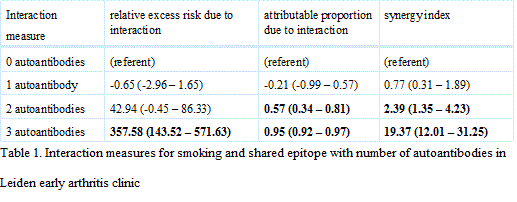Session Information
Session Type: ACR Concurrent Abstract Session
Session Time: 2:30PM-4:00PM
Background/Purpose :
In rheumatoid arthritis (RA) a biological hypothesis has been proposed linking
smoking with citrullination, the development of anti-citrulline autoimmunity
and anti-citrullinated protein antibodies (ACPA) and subsequently RA1.
The fact that smoking is associated with several autoantibodies in other
autoimmune diseases raised the question if in RA smoking is solely associated
with ACPA or with autoantibodies in general.
Objectives:
To
investigate if in patients with RA, smoking is specifically associated with ACPA
or with the presence of other autoantibodies as well.
Methods :
Patients from three independent early
arthritis cohorts were used: the Leiden Early Arthritis Clinic (n=767), the British
Norfolk Arthritis Register (n=761) and the Swedish Better
Anti‐Rheumatic
Fharmaco Therapy cohort (n=795). All patients fulfilled the 1987 RA criteria
and had symptom duration of less than two years. Smoking (ever versus never)
and autoantibody status: rheumatoid factor (RF), ACPA and anti-carbamylated
protein antibodies (anti-CarP), were determined at inclusion into this studies.
A meta-analysis was performed calculating odds ratios and 95% confidence
intervals to assess the association between
number of autoantibodies and smoking, using 2×2 comparison with seronegative
RA patients as reference category. In the Leiden EAC, interaction between
smoking and shared epitope (SE) was assessed using the three measures of
biological interaction: relative excess risk due to interaction,
the attributable proportion due to interaction and
the synergy index.
Results: There
was no significant association between smoking and seropositive RA in patients
who were positive for one autoantibody only (n=406). However, smoking was
significantly associated with double (n=429) and triple autoantibody-positivity
(n= 606) (figure 1). Furthermore, interaction measures
between smoking and SE were not significant for patients with one autoantibody,
partly significant for patients with two autoantibodies, whereas all three
measures were significant in the triple-positive group (table 1).
Conclusion:
Smoking and the interaction between smoking and SE is not solely associated
with ACPA-positive RA, but with the concurrent presence of all three RA-associated
autoantibodies. These data indicate that current
hypotheses on the role of smoking in the pathophysiology of RA may need to be refined by taking the presence of other
auto-antibodies into account.
References
To cite this abstract in AMA style:
van Wesemael T, Muhammad A, ajeganova S, Humphreys J, Symmons DPM, Macgregor AJ, Hafström I, Trouw L, Huizinga TWJ, Svensson B, Toes REM, Verstappen SM, van der Woude D. In Rheumatoid Arthritis, Smoking Is Not Associated with Anti-Citrullinated Protein Antibodies per Se, but with the Concurrent Presence of Rheumatoid Factor, Anti-Citrullinated Protein Antibodies and Anti-Carbamylated Protein Antibodies [abstract]. Arthritis Rheumatol. 2015; 67 (suppl 10). https://acrabstracts.org/abstract/in-rheumatoid-arthritis-smoking-is-not-associated-with-anti-citrullinated-protein-antibodies-per-se-but-with-the-concurrent-presence-of-rheumatoid-factor-anti-citrullinated-protein-antibodies-and-a/. Accessed .« Back to 2015 ACR/ARHP Annual Meeting
ACR Meeting Abstracts - https://acrabstracts.org/abstract/in-rheumatoid-arthritis-smoking-is-not-associated-with-anti-citrullinated-protein-antibodies-per-se-but-with-the-concurrent-presence-of-rheumatoid-factor-anti-citrullinated-protein-antibodies-and-a/


